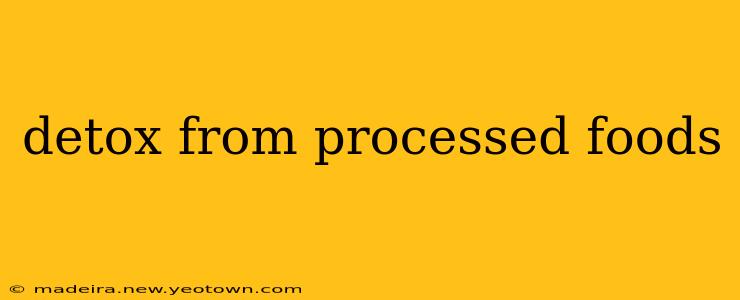It started subtly. A craving for a salty chip, a quick grab of a sugary snack, the convenience of a pre-packaged meal. Before you knew it, processed foods had woven themselves into the fabric of your daily life. But now, you're ready for a change. You're ready to detox from processed foods and reclaim your health. This isn't about deprivation; it's about rediscovering the joy of real food and feeling truly energized. This journey is about more than just weight loss; it's about feeling better, inside and out. Let's embark on this adventure together.
What Exactly are Processed Foods?
Before we dive into the detox, let's define our enemy. Processed foods aren't just the obvious culprits like fast food. They encompass a wide range of items, many found in seemingly healthy sections of your grocery store. We're talking about anything that has undergone significant processing to extend shelf life, enhance taste, or improve appearance. This includes foods with added sugars, unhealthy fats, artificial colors, flavors, and preservatives. Think packaged snacks, sugary cereals, canned soups brimming with sodium, and even some seemingly healthy yogurt options packed with sugar. Recognizing these hidden culprits is the first crucial step.
How Long Does a Processed Food Detox Take?
How long should a processed food detox last?
There's no one-size-fits-all answer. Some people find significant improvements within a week, while others benefit from a longer, more gradual approach of several weeks or even a month. Listen to your body. If you feel overwhelmed or experience significant withdrawal symptoms, don't hesitate to slow down the process. The goal isn't to punish yourself; it's to create sustainable, healthy habits. Start with small, manageable changes, and gradually increase your intake of whole foods.
What are the Benefits of a Processed Food Detox?
What are the benefits of eliminating processed foods from my diet?
The rewards of a processed food detox extend far beyond weight management. You can expect improvements in various aspects of your well-being:
- Improved Energy Levels: Processed foods often lead to energy crashes. By eliminating them, you'll experience more consistent and sustained energy throughout the day.
- Better Digestion: Whole foods are easier to digest than processed counterparts, often leading to improved gut health and fewer digestive issues.
- Clearer Skin: Many people report clearer skin after reducing their intake of processed foods and added sugars.
- Weight Management: By focusing on nutrient-dense, whole foods, you'll naturally feel fuller for longer, which can aid in weight management.
- Reduced Inflammation: Processed foods often contribute to inflammation in the body. A detox can help reduce inflammation and improve overall health.
- Improved Mood: Studies have shown a correlation between diet and mood. Eliminating processed foods and incorporating whole foods can lead to improved mental well-being.
What Should I Eat During a Processed Food Detox?
What foods should I eat instead of processed foods?
Focus on whole, unprocessed foods that are as close to their natural state as possible. This includes:
- Fruits and Vegetables: Load up on a rainbow of colors! Aim for a variety of fruits and vegetables to ensure a wide range of nutrients.
- Lean Proteins: Choose lean sources of protein like chicken breast, fish, beans, lentils, and tofu.
- Whole Grains: Opt for whole grains like brown rice, quinoa, oats, and whole-wheat bread.
- Healthy Fats: Include sources of healthy fats like avocados, nuts, seeds, and olive oil.
- Water: Stay well-hydrated by drinking plenty of water throughout the day.
How to Gradually Reduce Processed Foods
What are the steps to gradually reduce processed foods?
Don't try to go cold turkey. Instead, gradually reduce your intake of processed foods over time. Here's a step-by-step approach:
- Awareness: Start by paying attention to what you're eating. Read food labels carefully and identify hidden sources of processed ingredients.
- Substitution: Gradually replace processed snacks with healthier alternatives like fruits, vegetables, nuts, or yogurt.
- Meal Planning: Plan your meals in advance to ensure you have healthy options readily available.
- Cook More Often: Cooking at home allows you to control the ingredients and avoid hidden processed foods.
- Listen to Your Body: Pay attention to how you feel after eating certain foods. If you feel sluggish or bloated, it's a sign to avoid those foods in the future.
Breaking free from processed foods isn't a race; it's a marathon. Celebrate small victories and don't be discouraged by occasional setbacks. Remember, this is a journey towards a healthier, happier you. Embrace the process, savor the deliciousness of real food, and enjoy the incredible benefits that await you.

